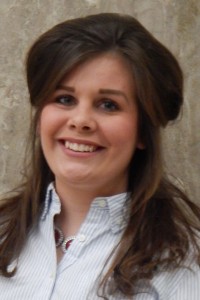Zamorano University, located just outside of Tegucigalpa, Honduras, is 2,500 miles from Kansas State University, equivalent to 47 hours by car or 11 hours by plane. For graduate interns Ricardo Auz, Ecuador; Lauren Benavidez, Nicaragua; and Paul Leiva, Honduras; the trip to Kansas has been well worth it.

The students’ internships are part of a partnership between K-State and Zamorano. Many Zamorano alumni have spent time in K-State’s Department of Agricultural Economics. The interns enroll in classes and work with professors on research projects.
“I think this is a good experience for us and also it opens doors to future interns from Zamorano to have the same experience,” Benavidez said. “Also, working with grad students is good because they provide us with advice about how we can get a master’s degree or how we can be better in some areas.”
All three students share a course schedule that includes AGEC 599, Food and Agribusiness Management Strategy with Aleksan Shanoyan, assistant professor; and AGEC 712, Optimization Techniques in Agricultural Economics, with Jason Bergtold, associate professor. Shanoyan’s class is a requirement for the students, however Bergtold’s class was chosen based on interests and recommendations from former Zamorano interns.
Auz, whose interests are in stock markets, works with Christine Wilson, professor, to update research about the equity markets for some companies in the food industry.
Benavidez studies international trade with Tian Xia, associate professor, looking specifically at exports of hard red winter wheat to Asia and how the Asian culture uses the exported wheat.
Leiva, who is interested in studying production economics at K-State, researches geographic information systems to study the distance from farms to ethanol plants in Kansas with Mykel Taylor, assistant professor, and Allen Featherstone, department head and professor.
The school system at Zamorano is set on a strict schedule of five classes in the morning followed by a specific lunch hour and work experience in the afternoon, whether it be in the fields, beef unit or elsewhere. The school provides the students with food and uniforms with laundry services so that the university serves as its own community. The students agree that despite the tight schedule at Zamorano, studying is much more time consuming at K-State.
Auz says the classes here take more focus, especially with the language difference. The emphasis on graduate student research at K-State rather than the emphasis on work experience at Zamorano also makes a big difference for the students because it presents a different type of learning opportunity.
“In my case, I studied in my same country,” Leiva said. “I had been to the U.S. before but never for so long, so for me it’s like a new experience to be with other people, other cultures and live in another country in a really different way from how I would live in my country. It has been really helpful and I have learned lots of things.”
Both Auz and Benavidez said that responsibility is one of the biggest lessons they have gotten out of studying here at K-State. Auz said that in addition, timeliness had been a big adjustment for him because arriving early is not a custom in South America. Benavidez added that she has learned the importance of patience in reviewing long lists of data to compile her weekly reports.
The students found many differences in the communities as well. Coming from the closed Zamorano community to a community 50 times larger, the students have seen more opportunities for interaction, especially with the graduate students. They have spent time with the Graduate Students in Agricultural Economics for breakfast club meetings, bowling and brown bag lunch sessions. They also interacted with other Zamorano alumni on campus.
The students have had a great time at K-State so far. All echoed that the K-State community is definitely like a family, and that they would recommend the program to other Zamorano students.
“K-State should maintain this program because it is so helpful for us and it is a good opportunity for us,” Auz said. “The people here are so kind.”

